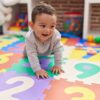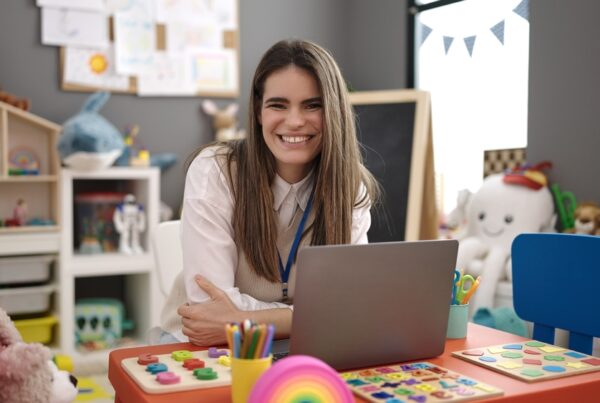Babies and young children can get a jump start on their creative development with the right learning toys. One way to do this is by using educational toys, games and puzzles.

Educational toys are a proven way to aid in a child’s development. They can help with the development of problem-solving, memory, social and emotional skills.
Educational toys help children learn through play. With hands-on activities such as puzzles, building blocks, shapes, colours and more, children can explore and discover how things work.
How educational toys can help little ones develop
There is a huge range of educational toys available to foster learning, creativity and motor skills.
Introducing a variety of fun and educational toys into the mix of activities will help children develop in multiple areas.
Here are some of the skills toddlers can benefit from:
- Learning cause and effect: Toys that have lights and sounds help children understand the concept of action and reaction.
- Problem-solving skills: Puzzles, building blocks, wooden toys and shape sorters teach kids how to think logically.
- Communication: Educational toys such as talking dolls and animals help children learn to read and speak.
- Engaging their imagination: Pretend play helps kids develop social skills, boost their self-esteem and spark creativity.
- Fine motor skills: Push-pull toys, shape sorters, puzzles and games with small pieces can help children practice and develop their fine motor skills.
- Hand and eye coordination: Manipulative toys like bead mazes and shape puzzles encourage children to use both their hands together while focusing on a task.
- Language development: Talking dolls, books, flashcards or CDs can help children develop their language skills.
- Creative thinking: Arts and crafts supplies such as paint sets can spark your child’s imagination.
Just because the toys are educational, it doesn’t mean they can’t be fun.
Choose educational toys that engage children and let them explore the worlds of science, maths and art while they experiment and learn.
Best toys at playtime for different ages
When it comes to buying educational toys, games and puzzles for your child or children in your care, it’s important to always consider their age.
Parents and carers can choose to include a variety of toys in their playtime activities, but it’s essential that you choose age-appropriate toys.
Babies


For babies, you want to give them toys that they can touch and feel.
Toys that make sounds are good too, because then your baby can learn about cause and effect.
Examples of appropriate toys for children in this age group include teethers, rattles, wooden toys and musical toys.
Babies are experiencing the world for the first time, and while they don’t have the same fine motor skills that older kids do, they can still benefit from educational toys (for example, Montessori toys) that help them explore.
Toddlers
As babies grow older, they can benefit from puzzles, wooden learning toys and play construction sets.
Educational games with beads or pegs help children practice their fine motor skills while strengthening their problem-solving abilities.
Parents and carers should include a variety of engaging toys that encourage exploration and allow toddlers to practice putting together puzzles and building objects so they can learn and entertain themselves while playing.
Preschoolers
At about three years old, kids can start to practice their logical critical thinking skills with jigsaw puzzles and number toys. They can also explore the world of science with age appropriate experiments and projects.
STEM toys are also a great way for preschoolers to learn about the world around them and practice their problem-solving skills.
Music toys, such as play pianos, are also a great way to help preschoolers develop their creativity and have fun.
Educational toys make an excellent gift from friends and family for Christmas or birthdays too.
Outdoor play is also important for growing children. Quality time in nature helps them build healthy habits, practice gross motor skills and explore the world around them.
Toys that facilitate outdoor play, such as soft mats and climbing frames help support this.

In conclusion
Overall, at any age, a combination of educational toys, games and puzzles will help your child develop in multiple areas while having an enjoyable playtime.
They’ll be able to explore the world around them while discovering how things work, learning shapes and colours, and engaging their imaginations.









